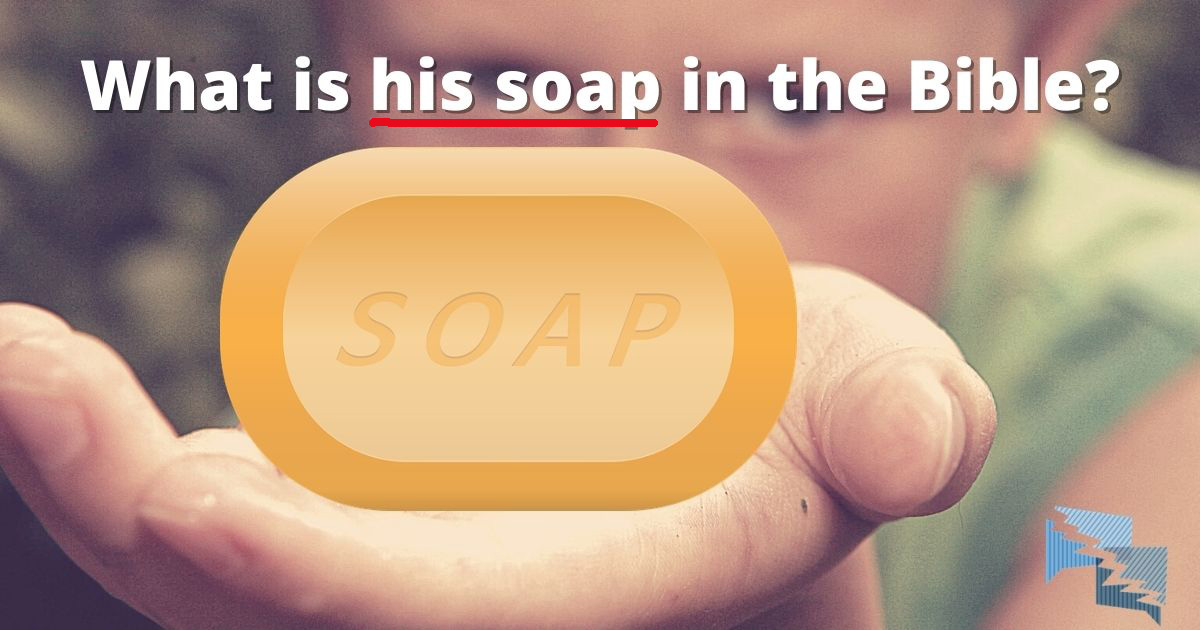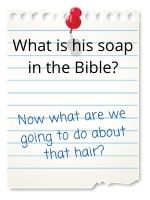
What is his soap in the Bible?
Welcome to the third chapter of Paul and his body odor of biblical proportions. We have cringed learning how John Mark fled shortly into Paul and Barnabas' first missionary journey because he couldn't handle the aroma of an unwashed apostle. And we've mourned with poor Timothy who felt cleanliness and godliness were not mutually incompatible.
Now our story turns to Paul's most formidable opponent. Not a centurion. Not a governor nor a king. Not even the emperor himself.
James, half-brother of Jesus and pastor of the church in Jerusalem.
Moments after poor Eutychus (he who had passed out from Paul's stench, fell out of a window, and died) was resurrected, Paul set sail to return to Jerusalem. The day after his arrival, he walked to the house where the church was holding a business meeting. As usual, James was pontificating. Paul entered the small, stuffy room, the buzzing of his companion flies filling the still air, and handed his knapsack to his sister's son who was sitting by the door, wondering why they were still arguing over what kind of wine to use for communion.
James was a pious and highly disciplined man. He saw trials in life as an opportunity to grow faith (James 1:2). He firmly believed that human anger did not bring God's righteousness (James 1:19-20). It was he who exhorted his people not to look in the mirror, turn away, and forget what they looked like (James 1:23-24). And it was he who wrote that faith without works is dead (James 2:14-26).
As the stench of years of travel filled the room, the pious, disciplined head pastor of the church found himself losing focus. He grew angry. He was certain that Paul had, indeed, forgotten what he looked like and, most likely, hadn't looked in a mirror for years. He found himself favoring anyone who had ever bathed. He clamped his teeth together, fearful of what vitriol his tongue would fall into. He wondered if, perhaps, God was tempting him to sin. What he did not do was pray for wisdom. Instead, he found himself falling into great sin.
The sin of eisegesis.
"What good is it, my brothers and sisters, if someone claims to be clean inside but is not so outside?" He swallowed heavily as a breeze from the door passed Paul and blew into his face. "Can a filthy spring produce fresh water?" He cringed, realizing he was playing a little loose with the translation. He shook himself. "Come near to God and he will come near to you. Wash your. . .hands, you sinners, and purify your. . .face, you double-minded."
James' strange words jolted the pastors' and elders' attention away from the fragrance. They looked at each other and murmured—what was he talking about? Meanwhile, Paul's nephew, hoping for a gift, opened the knapsack. His eyes watered with the fumes but not before they landed on a box, wrapped in leather. He dropped the bag and untied the thongs. Not a box.
The pious pastor caught sight of the young lad. "What is that, boy?"
Paul's nephew held up the unused bar. "His soap, sir."
"What?" Paul croaked. He started to turn toward the boy but James caught his arm.
"Hyssop!" James cried out. "Hyssop! 'Cleanse me with hyssop, and I will be clean; wash me, and I will be whiter than snow!'" he quoted, rather more accurately. "The Lord has spoken. Paul, we have faithful men who are completing a vow. You must guide them through their final purification ritual. By cleansing. With hyssop. Or his soap, either way."
And so, Paul was finally forced to bathe. While he did so, James had his nephew steal his clothes and the elders scrounged some used but clean-smelling robes. Luke barely recognized him. His sister actually let him into her house for dinner.
Then he was arrested. But at least he smelled good.
Now our story turns to Paul's most formidable opponent. Not a centurion. Not a governor nor a king. Not even the emperor himself.
James, half-brother of Jesus and pastor of the church in Jerusalem.
Moments after poor Eutychus (he who had passed out from Paul's stench, fell out of a window, and died) was resurrected, Paul set sail to return to Jerusalem. The day after his arrival, he walked to the house where the church was holding a business meeting. As usual, James was pontificating. Paul entered the small, stuffy room, the buzzing of his companion flies filling the still air, and handed his knapsack to his sister's son who was sitting by the door, wondering why they were still arguing over what kind of wine to use for communion.
James was a pious and highly disciplined man. He saw trials in life as an opportunity to grow faith (James 1:2). He firmly believed that human anger did not bring God's righteousness (James 1:19-20). It was he who exhorted his people not to look in the mirror, turn away, and forget what they looked like (James 1:23-24). And it was he who wrote that faith without works is dead (James 2:14-26).
As the stench of years of travel filled the room, the pious, disciplined head pastor of the church found himself losing focus. He grew angry. He was certain that Paul had, indeed, forgotten what he looked like and, most likely, hadn't looked in a mirror for years. He found himself favoring anyone who had ever bathed. He clamped his teeth together, fearful of what vitriol his tongue would fall into. He wondered if, perhaps, God was tempting him to sin. What he did not do was pray for wisdom. Instead, he found himself falling into great sin.
The sin of eisegesis.
"What good is it, my brothers and sisters, if someone claims to be clean inside but is not so outside?" He swallowed heavily as a breeze from the door passed Paul and blew into his face. "Can a filthy spring produce fresh water?" He cringed, realizing he was playing a little loose with the translation. He shook himself. "Come near to God and he will come near to you. Wash your. . .hands, you sinners, and purify your. . .face, you double-minded."
James' strange words jolted the pastors' and elders' attention away from the fragrance. They looked at each other and murmured—what was he talking about? Meanwhile, Paul's nephew, hoping for a gift, opened the knapsack. His eyes watered with the fumes but not before they landed on a box, wrapped in leather. He dropped the bag and untied the thongs. Not a box.
The pious pastor caught sight of the young lad. "What is that, boy?"
Paul's nephew held up the unused bar. "His soap, sir."
"What?" Paul croaked. He started to turn toward the boy but James caught his arm.
"Hyssop!" James cried out. "Hyssop! 'Cleanse me with hyssop, and I will be clean; wash me, and I will be whiter than snow!'" he quoted, rather more accurately. "The Lord has spoken. Paul, we have faithful men who are completing a vow. You must guide them through their final purification ritual. By cleansing. With hyssop. Or his soap, either way."
And so, Paul was finally forced to bathe. While he did so, James had his nephew steal his clothes and the elders scrounged some used but clean-smelling robes. Luke barely recognized him. His sister actually let him into her house for dinner.
Then he was arrested. But at least he smelled good.
This is what WOULD happen if GotQuestions.org genuinely, honestly answered all the mis-typed, autocorrected, or otherwise altered "spiritual" questions that come their way every day.
HOME | ABOUT | CATEGORIES | CONTACT | THE REAL SITE
© 2024 Got Questions Ministries. All rights reserved.

